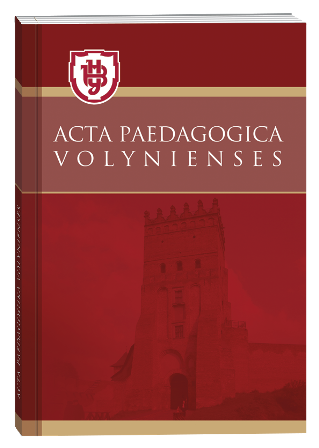THEORETICAL BASES OF FORMATION OF ICT COMPETENCE OF JUNIOR SCHOOLCHILDREN
DOI:
https://doi.org/10.32782/apv/2022.1.2.13Keywords:
ICT competence, competence approach, innovations, digital technologies, innovative teaching aids, ICT competence modelAbstract
The article is devoted to the problem of formation of ICT competence in junior schoolchildren, its components and approaches; emphasis is placed on the ability to master modern ICT technologies, on the formation of ICT competence of primary school students in the implementation of the State Standard of Primary Education; Innovative teaching aids used in primary school in the framework of the State Standard are analyzed. Modern society is characterized by a global process of informatization, a rapid transition to a new stage of development – the information society. In this regard, among the main strategic goals of the information society in Ukraine is the provision of computer and information literacy, primarily by creating an education system focused on the use of new information and communication technologies (ICT) in the formation of a fully developed personality. Evolution of modern education, informatization of education, mass computerization of educational institutions, constant modernization of computer equipment, development of computer networks, expansion of personal computerization of society, increasing the volume of software products designed for use in the educational process – conditions that create new information and communication pedagogical environment. The implementation of the modern educational paradigm largely depends on the primary school teacher. Today, the teacher is no longer the main source of knowledge for students who receive a significant amount of information in the information and communication environment created by television, videos, computer programs and games, a variety of educational and popular science literature, and so on. This requires modern higher professional education to train specialists who are able to navigate in numerous variable flows of information, be critical of it, be able to create, process and transmit the necessary information, constantly self-improvement in personal and professional terms to the requirements of society. The solution to this problem is the professional training of future teachers in the information and communication pedagogical environment, the formation of information competencies.
References
Гусинський Е.Н. Етапи набуття компетентності. Розвиток і оцінка компетентності : тези доповідей всеукр. наук. конф., м. Київ, 14 березня 2011 р. Київ, 2011. С. 37.
Державний стандарт початкової освіти. 2018. URL: http://mоn.gоv.uа.
Зайцева О.Б. Формування інформаційної компетентності майбутніх учителів засобами інноваційних технологій : автореф. дис. … канд. пед. наук. Бердянськ, 2002. 76 с.
Зимова І.А. Ключові компетенції – нова парадигма результатів освіти. Інтернет-журнал «Ейдос». 2009. № 4. С. 65–66.
Іванов Д.А., Митрофанов К.Г., Соколова О.В. Компетентнісний підхід в освіті: проблеми, поняття, інструментарій : навчальний посібник. Київ : Освіта, 2009. 132 с.
Концепція «Нова українська школа». Інформаційний збірник МОН України. 2016. URL: http://mоn.gоv.uа.
Полат Е.С. Нові педагогічні та інформаційні технології в системі освіти : посібник. Київ : ВЦ «Академія», 2010. 210 с.
Хуторський А.В. Ключові компетенції як компонент особистісно орієнтованої парадигми освіти. Учень оновлюється в школі. 2002. № 4. С. 56–58.







